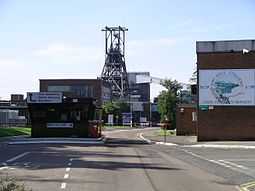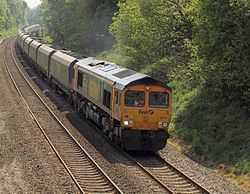Daw Mill
 Entrance to Daw Mill colliery, September 2006 | |
| Location | |
|---|---|
| Location | Arley, Warwickshire |
| Country | United Kingdom |
| Production | |
| Products | Coal from the Warwickshire Coalfield |
| History | |
| Opened | 1956 |
| Active | 1956-2013 |
| Closed | 2013 |
| Owner | |
| Company | UK Coal |
Daw Mill was a coal mine located near the village of Arley, near Nuneaton, in the English county of Warwickshire. The mine was Britain's biggest coal producer.[1] On 7 March 2013 the owner, UK Coal, announced the mine would be closed following a major fire. It was the last remaining colliery in the West Midlands.[2]
The mine
Daw Mill mined a five-metre thick section of the Warwickshire Coalfield (known as the Warwickshire Thick) in the north of the county. It was owned and operated by UK Coal and in 2008 employed 680 people.[1]
The two shafts that served Daw Mill were first sunk between 1956 and 1959, and 1969 and 1971 respectively. The mine was a natural extension of the former collieries Kingsbury Colliery and Dexter Colliery, both of which have also closed. In 1983 an inclined tunnel linking underground workings with the surface was completed. This drift mining enabled Daw Mill to increase its production capacity as it removed the often time-consuming process of winding coal up the shafts.
Daw Mill was the last surviving mine in a county that once had 20 operating collieries.[3] In 2008 it excavated 3.25 million tons of coal, beating a 13-year-old record for annual output at a British coal mine set at Selby in North Yorkshire.[1]
Transport

The colliery was situated on the Birmingham to Nuneaton Line, just east of the former Shustoke railway station. Trains were operated by GB Railfreight.
Accidents
Three men were killed at Daw Mill in mining accidents in 2006 and 2007. In 2011 UK Coal was fined £1.2 million for safety breaches.[4]
On 22 February 2013, a major fire broke out 500 metres (1,600 ft) underground, described as the worst underground blaze in Britain for 30 years. UK Coal and Warwickshire Fire and Rescue Service confirmed that 92 workers were safely extracted. As of 3 March 2013 the fire had still not been fully extinguished. It was initially estimated that remedial work to the colliery could take between three and six months, making a return to production subject to a further review, resulting in the possible immediate closure of the mine.[5]
Closure
On 14 March 2012 it was reported that UK Coal had begun a consultation process as part of plans for a company restructure which could see the closure of the mine in 2014.[6][7]
On 10 July 2012, UK Coal had suggested that if High Speed 2 were to be built, then Daw Mill would be forced to close due to associated development and the effects on local groundworks.[2]
On 7 March 2013 UK Coal announced the closure of the mine, due to the destructive fire which had extensively damaged it, with the plan to make most of the 650 staff redundant.[8]
See also
References
- ↑ 1.0 1.1 1.2 Macalister, Terry (8 December 2008). "Colliery on track for record output shows King Coal is striving to regain crown". The Guardian. Retrieved 20 February 2009.
- ↑ 2.0 2.1 "HS2 could mean closure of Daw Mill". Coventry Telegraph. Retrieved 25 February 2013.
- ↑ Evans, Steve (21 June 2006). "Miner dies at Daw Mill". Coventry Telegraph. Retrieved 20 February 2009.
- ↑ "UK Coal fined over miner deaths at Daw Mill and Welbeck". BBC News. 14 December 2011. Retrieved 22 December 2011.
- ↑ "Daw Mill coal mining may end after 'ferocious' fire". BBC News. 25 February 2013. Retrieved 25 February 2013.
- ↑ "UK Coal 'may close Daw Mill colliery'". BBC News (BBC). 14 March 2012. Retrieved 14 March 2012.
- ↑ "Daw Mill 'likely' to shut in 2014, says UK Coal". BBC News (BBC). 11 August 2012. Retrieved 10 March 2013.
- ↑ "Daw Mill: Hundreds of jobs go at fire-hit mine". BBC News. 7 March 2013. Retrieved 7 March 2013.
External links
- UK Coal profile of Daw Mill
- A Profile of Daw Mill Colliery
- Daw Mill @ Mine-Explorer.co.uk
- Cutting edge information from deep underground, document about Daw Mill Colliery